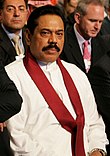Sri Lankan local government elections, 2011
|
|
|||||||||||||||||||||||||||||
|---|---|---|---|---|---|---|---|---|---|---|---|---|---|---|---|---|---|---|---|---|---|---|---|---|---|---|---|---|---|
|
|||||||||||||||||||||||||||||
|
4,327 seats across 322 local authorities |
|||||||||||||||||||||||||||||
| Turnout | 65.52% | ||||||||||||||||||||||||||||
|
|||||||||||||||||||||||||||||
Local elections were held in Sri Lanka on 17 March 2011, 23 July 2011 and 8 October 2011 to elect 4,327 members for 322 of the 335 local authorities in the country. 13.7 million Sri Lankans were eligible to vote in the election. Elections to two other local authorities in Mullaitivu District are due but have been repeatedly postponed due to alleged delays in resettling internally displaced persons. Elections to the remaining 11 local authorities are not due as they had their last election in 2008 or 2009.
The United People's Freedom Alliance's domination of Sri Lankan elections continued as expected. It won control of 270 local authorities (including two contesting as the National Congress), the Tamil National Alliance won 32 local authorities (including two contesting as the Tamil United Liberation Front), the United National Party won 9 local authorities, the Sri Lanka Muslim Congress won 5 local authorities and a UPFA backed independent group won one local authority. There was no overall control in the five remaining local authorities but the UPFA was the largest group in three, the UNP in one and the Up-Country People's Front in one.
These elections, like previous elections in Sri Lanka, had been marred by violence and violations of electoral law. Despite this the Election Commissioner judged the elections to be peaceful, free and fair.
The last major round of local government elections was held in 2006 when elections were held in 288 of the then 330 local authorities. Elections were not held in the remainder due to the ongoing civil war. In 2008 elections were held for 9 local authorities in Batticaloa District and in 2009 elections were held for 2 local authorities in the Northern Province.
...
Wikipedia



